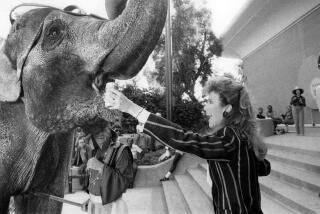From the Archives: Ann Sothern; Gave Strong Women a Voice in Film and TV
Ann Sothern, the veteran actress best known for her deft portrayals of sassy and resourceful blonds in television sitcoms of the 1950s and 1960s, died of heart failure Thursday at her home in Ketchum, Idaho. She was 92.
Sothern’s career spanned seven decades, beginning with the popular “Maisie” films of the 1940s that made her an MGM leading lady. Later she became a dominant presence in TV’s golden era as the star of two CBS comedy series, “Private Secretary” and “The Ann Sothern Show.”
She acted in more than 70 films, finally earning an Oscar nomination at the age of 78 in “The Whales of August,” a 1987 movie in which she co-starred with Lillian Gish and Bette Davis.
Two years ago she was honored with a retrospective at the Museum of Modern Art in New York City. The festival showcased 11 of her films, including “Folies Bergere” (1935) with Maurice Chevalier, Joseph L. Mankiewicz’s “A Letter to Three Wives” (1949) and the MGM chiller “Shadow on the Wall” (1950).
She found her broadest audience on television. She played Susie, the meddlesome secretary of a talent agent played by Don Porter in “Private Secretary,” which ran on CBS from 1953 to 1957.
She returned to CBS to play assistant hotel manager Katy O’Connor in “The Ann Sothern Show,” which aired from 1958 to 1961.
“The best comedian in this business, bar none, is Ann Sothern,” said the late Lucille Ball, an old friend who guest-starred as Lucy Ricardo in the first episode of the Sothern show.
Sothern earned five Emmy nominations and a Golden Globe for her work on the two shows.
She later provided the voice of the car in the 1960s sitcom “My Mother the Car,” which starred Jerry Van Dyke as the owner of an antique car that turns out to be the reincarnation of his mother.
Sothern was born Harriette Lake in Valley City, N.D., on Jan. 22, 1909. Her father was a businessman who deserted the family when she was about 6. She was raised by her mother, an opera singer and diction coach.
She began acting at 18 as an extra in an early sound musical, “The Show of Shows,” then made her Broadway debut in the chorus of Florenz Ziegfeld’s “Smiles. By 1933, she was on contract at Columbia Pictures, where studio boss Harry Cohn changed her name to Ann Sothern. She earned the nickname “Queen of the Bs” for her leading roles throughout the 1930s in many Columbia and RKO musicals, comedies and dramas, including “The Hell Cat,” “Eight Bells” and “Smartest Girl in Town.”
Popular Series of ‘Maisie’ Films
In 1939 MGM cast her in the first of what would be a series of 10 movies about a brassy and independent showgirl named Maisie.
The “Maisie” films were so profitable for MGM that, when Sothern asked out after No. 6, studio chief Louis B. Mayer said, “Too bad, honey, your pictures pay for our mistakes, so you just stay in ‘em.”
The films became so well known that fans could reach Sothern by addressing their letters to “Maisie, USA.”
In the 1941 release, “Lady Be Good,” the petite actress with a round, kewpie-doll face and zaftig figure sang the year’s Academy Award-winning song, a Jerome Kern and Oscar Hammerstein number called “The Last Time I Saw Paris.”
She earned rave reviews in 1949 for her portrayal opposite Kirk Douglas in “A Letter to Three Wives,” which won Oscars for Mankiewicz’s script and direction. Sothern appeared in the television remake in 1985.
Her portrayals of strong women made her the subject of scholarly attention in the 1990s. In a 1999 article in the journal Film Comment, producer Mike Kaplan described the prototypically feminist Maisie as a “consistently liberated presence.” The same year feminist scholar Lisa Parks noted that Sothern’s portrayal of an older, happily single career woman in “Private Secretary” ran counter to societal expectations for women in the 1950s.
Feeling underappreciated by Hollywood and tired of Los Angeles’ traffic and unhealthy air, Sothern retired in 1984 and moved to Idaho, where she had spent many winters.
“I think Hollywood has been terrible to me,” she told the New York Times in 1987. “Hollywood doesn’t respond to a strong woman, not at all. I was too independent. How dare a woman be competitive or produce her own shows?”
She made those comments as she awaited the release of “The Whales of August,” a delicate story about coming to terms with old age that starred Gish and Davis as two elderly sisters and Sothern as their vivacious neighbor on an island off the coast of Maine. It was Sothern’s first feature film since breaking her back in a stage accident in 1976.
When Davis heard Sothern had been cast as Gish’s best friend Tisha, she said: “She’s a good actress--she could steal the picture.” Of the small cast, which also featured Vincent Price as a Russian emigre in search of a home, only Sothern garnered an Oscar nomination.
“I’ve always resented being called a pert and sassy comedian because I am essentially and basically an actress,” she said at the time.
Sothern, who made no more films after “The Whales of August,” enjoyed painting and had an exhibit of her work at Elizabeth’s Staircase Gallery in West Hollywood in 1990.
Her first marriage, to actor Roger Pryor, ended in divorce in 1942. The next year she married Robert Sterling, with whom she had a child, the actress Tisha Sterling. She was divorced from Sterling in 1949.
In addition to her daughter, she is survived by granddaughter Heidi Bates Hogan and a sister, Sally Adams, of Boise.
A Mass will be held on Friday, at 1 p.m. at Our Lady of the Snows Church in Ketchum.
More to Read
Start your day right
Sign up for Essential California for the L.A. Times biggest news, features and recommendations in your inbox six days a week.
You may occasionally receive promotional content from the Los Angeles Times.







